De Nederlandse dichter en classicus Jan Hendrik Leopold werd geboren in ’s-Hertogenbosch op 11 mei 1865. Zie ook alle tags voor J. H. Leopold op dit blog.
O dood vlies van de torengracht
O dood vlies van de torengracht
en wreed gewekte kreet der zwanen,
de angst vloeit klam toe door de lanen
en stolt rondom de pijlerschacht.
O krimpend hart, dat uit de sprong
der wurgende belagers hoog naar boven
omhoog zich worstelde sloven
aamechtig sinds het zich ontwrong,
walmende lamp, die opgetild
met floersen roet het smeulend gele
verduisterde en wuft het ele
leven des luchters had omhuld.
Idylle
En is het daarbuiten ook donker en koud
En droevige wintertijd,
Mijn lief, ’t is lente om mij heen,
Nu ge in mijne armen zijt.
En schijnt ook geen ster door de grauwe mist
En huilt ook de storm door de nacht –
Ik schuif de armstoel bij het vuur,
De zetel van ’t voorgeslacht.
Blond meisje met uw rozenmond,
Kom, zet u op mijn knie,
Vertel mij van al de liefde, zo zoet,
Die ik in uwe ogen zie.
Stil, stil, dat ons de wind niet hoort
En met onze woorden spot,
Gij buigt u over tot mijn gezicht,
En ik beef van stil genot.
Ik voel uw zoete adem gaan
En uw boezem zo warm en zacht,
En langs mijne wangen dartelt stout
Uwe blonde lokkenpracht.
Schoon kind, gij zijt mij als de zon
In de klare, blauwe lucht,
En het is mij of ik de leeuwerik waar
Die juichend tot u ontvlucht.
Ja, ik wil zingen te uwer eer,
O, gouden zon van mijn ziel,
Van vreugde dronken over uw licht,
Dat er in mijn harte viel.
En is het daarbuiten ook donker en koud
En droevige wintertijd,
Mijn lief, ’t is lente om mij heen,
Nu ge in mijn armen zijt.
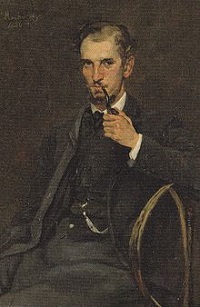
J. H. Leopold (11 mei 1865 – 21 juni 1925)
Portret door Martin van Andringa, 1886
De Nederlandse dichteres Ida Gerhardt werd geboren in Gorinchem op 11 mei 1905. Zie ook alle tags voor Ida Gerhardt op dit blog.
Vergeef mij dat de schoonste nachten…
Vergeef mij dat de schoonste nachten
niet immer van ons beiden zijn.
Mijn vriend, het zijn zo groten machten
waardoor wij soms gescheiden zijn.
Wanneer ik in de hof mag dwalen
waar s hemels roos mij open gaat,
dan ducht ik zelfs Uw ademhalen,
Uw hart dat in het donker slaat.
Laat mij in eenzaamheid de uren
dat ik mijn diepste wet aanvaard.
Hun pracht die onverwelkt zal duren,
zij wordt alleen voor U vergaard.
ANNO DOMINI 1972
Er is te Heiligerlee een klok gegoten
en het was in de inzet van zijn stem:
of aarde en hemel samen vrede sloten;
hij zong – de wil des makers wekte hem.
En met de macht van zijn metalen mond
riep hij mij aan met name waar ik stond.
En stemmeloos heb ik het uitgestoten:
‘Géén, Holland, heeft als gìj mijn hart doorwond.’
Schlüszli
Het dorp ligt wit
-wàt een sneeuw! –
Ik klim naar boven met twee
verse broden onder mijn arm.
Ze luiden, het is acht uur.
Het begint weer, witte
vlokken en witte
woorden, het daalt zò maar.
O zie, het is woord geworden! –
op mijn donkere mouw
het kristal.
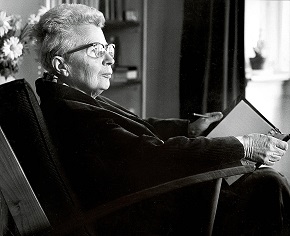
Ida Gerhardt (11 mei 1905 – 15 augustus 1997)
De Roemeense schrijver Eugen O. Chirovici werd op 11 mei 1964 geboren in Făgăraș, Transsylvanië. Zie ook alle tags voor Eugen O. Chirovici op dit blog.
Uit: The Book of Mirrors
“For the first time in many years I fell asleep without taking a pill first, and the next day, after telling the people at the agency that I’d be off sick for the next two weeks, I continued to write.
The details of those months in ’87 came back to my mind with such force and clarity that they quickly became more vivid and powerful than anything else in my present life. It was as if I’d woken up from a deep sleep, during which my mind had silently been preparing itself for the moment when I’d begin to write about the events whose protagonists were Laura Baines, Professor Joseph Wieder and me.
Of course, given its tragic outcome, the story found its way into the newspapers at the time, at least in part. I myself got harassed by police detectives and reporters for quite a while. That was one of the reasons that led me to leave Princeton and finish my MA at Cornell, living for two long and dusty years in Ithaca. But nobody ever found out the truth about the whole story, which changed my live forever.
As I said, I chanced upon the truth three months ago, and I realised that I had to share it with others, even though the anger and frustration that I felt, and still feel, were overwhelming. But sometimes hatred and pain can be a fuel just as strong as love. The result of that intention is the manuscript I recently completed, after an effort that left me physically and mentally exhausted. I attach a sample, in accordance with the instructions I found on your website. The manuscript is complete and ready for submission. If you’d be interested in reading the whole thing, I’ll send it to you immediately. The working title I’ve chosen is The Book of Mirrors.
I’ll stop here, because on the screen of my laptop I can see that I’ve already exceeded the 500-word limit for a query. Anyhow, there’s not much else to say about me. I was born and raised in Brooklyn, I’ve never been married, nor had children, partly, I believe, because I’ve never truly forgotten Laura. I have a brother, Eddie, who lives in Philadelphia and whom I see very rarely. My career in advertising has been uneventful, with neither outstanding achievements nor unpleasant incident – a dazzling grey life, hidden among the shadows of Babel. Today, as I gradually reach the end of my working life, I’m a senior copywriter at a middling agency based in Manhattan, quite close to Chelsea, where I’ve lived for more than two decades. I don’t drive a Porsche and I don’t book five-star hotels, but nor do I have to worry about what the next day will bring, at least not when it comes to money.
Thank you for your time and please let me know whether you’d like to read the full manuscript. You’ll find my address and phone number below.
Yours sincerely,
Richard Flynn”

Eugen O. Chirovici (Făgăraș, 11 mei 1964)
De Duitse dichter en schrijver Andre Rudolph werd geboren in Warschau op 11 mei 1975 en groeide op in Leipzig. Zie ook alle tags voor Andre Rudolph op dit blog.
nocturne für jesse thoor
ich hatte kontakt zu einem heiligen
in hohen, fettglänzenden
schuhn
er ließ sich von seinen füßen tragen
in würde, er entleerte sich
in der früh in würde
so war er.
die toten amseln fielen von seinen
schultern, wenn er
sich zuckte
er rieb seinen schwanz an den mauern
der häuser, wenn es
ihn juckte
und roch nach frischem sperma
und rosmarin, wie
ein könig
so war er.
die zahmen häuser peitschten
seinen scheitel auf, bis
er lachte
die schenkel der triangeln glühten,
wenn er es ihnen
machte
so war er.
rasend schnell, und schlaflos, und
expressiv, als er mich
im vorübereilen
segnete und sagte: „iss deine
pizza, herzchen
und stirb!“
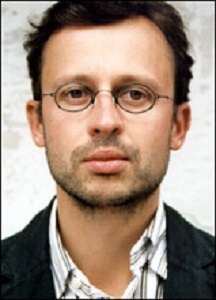
Andre Rudolph (Warschau, 11 mei 1975)
De Braziliaanse schrijver José Rubem Fonseca werd geboren op 11 mei 1925 in Juiz de Fora. Zie ook alle tags voor Rubem Fonseca op dit blog.
Uit:Vast Emotions and Imperfect Thoughts (Vertaald door Clifford E.Landers)
`What now what?’
`Now.’
`Now what?’
`Now.’
We were standing on the sidewalk.
`Good night,’ I said.
She held me by the arm. `I have a rubber; you don’t have to be afraid.’
`It’s not that. I’m tired.’
When I got home I sat in an armchair and stared at the ceiling. Ruth’s diary was still on the floor. The disorder of things seemed to have increased.
I went back to working on the script. I had to decide what to reply to Dietrich; he’d only given me a week.
I rewrote the scene, starting with the moment Dolguchov is found by Liutov and Grishchuck lying against a tree. His legs are spread and extended, his boots dirty and torn; his belly is ripped open and his guts are visible, as well as his beating heart. Dolguchov asks Liutov to kill him: `The Poles are coming back to do their dirty work. Here are my papers. You’ll write and tell my mother how it happened.’ But Liutov doesn’t have the courage to kill him and, spurring his horse, rides off. Dolguchov stretches out, after first examining the bluish palm of his hand. `All right then, run away, you pig.’ Then Afonka arrives and asks what’s going on.
My text went like this: Afonka comes up to Dolguchov. He dismounts. The two men talk, the one on foot, covered with dust, radiating strength, and the dying man lying on the ground. Liutov, watching from a distance, can’t hear what they’re saying. Dolguchov gives Afonka his papers. Afonka puts them in his bag. He goes at once to his horse and withdraws the rifle from the saddlebow. Then, with slow but firm steps, he returns to Dolguchov, the light of the setting sun behind him. Dolguchov, supporting himself on his elbows, raises his head slightly and looks at Afonka. Afonka places the rifle barrel in Dolguchov’s acquiescent mouth and shoots.”

Rubem Fonseca (Juiz de Fora, 11 mei 1925)
Juiz de Fora
De Duitse schrijver Henning Boëtius werd geboren op 11 mei 1939 in Langen, Hessen. Zie ook alle tags voor Henning Boëtius op dit blog.
Uit: Phönix aus der Asche
“Dann scheidet für dich wahrscheinlich auch die vierte Theorie aus: Funkenflug und Feuer durch unvorsichtiges Verhalten, zum Beispiel Rauchen eines Passagiers oder eines Besatzungsmitgliedes .”
“Ja. Sie macht keinen Sinn.”
“Bleibt die Sabotagetheorie. Da gibt es zwei Möglichkeiten: ein Schuss von außen oder eine Höllenmaschine im Inneren. Wir haben die erste Alternative untersucht. Es gibt keinerlei Anzeichen, dass auf das Schiff geschossen wurde.”
“Es hätten wie gesagt auch schon Phosphorgeschosse sein müssen. Und Alternative zwei hat es ebenfalls schwer. Die Sicherheitskontrollen waren diesmal extrem. Keiner der Passagiere kommt in Frage, auch dieser dubiose Artist nicht, den du verdächtigst. Außerdem gibt es kein Bekennerschreiben. Für die Mannschaft lege ich meine Hand ins Feuer. Kein Luftschiffer würde je seine Kameraden in den Tod schicken, egal zu welcher politischen Couleur er gehört. Nein, das scheidet völlig aus. Du weißt vielleicht nicht, was das deutsche Wort Kameradschaft für einen schwergewichtigen Inhalt hat!”
“Und was bleibt dann noch als Ursache übrig? Welche sechste Theorie?”
Eckener füllte sein Glas erneut, nippte daran und sagte: “Very strange. Very strange.”
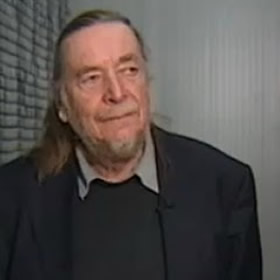
Henning Boëtius (Langen, 11 mei 1939)
De Spaanse schrijver Camilo José Cela werd geboren op 11 mei 1916 in Iria Flavia. Zie ook alle tags voor Camilo José Cela op dit blog.
Uit:The Family of Pascual Duarte (Vertaald door Anthony Kerrigan)
“No one in Almendralejo knew or cared that I had been fishing, that at that moment I was watching the lights in their houses come on, that I was guessing what they said and imagining in my mind the subjects of their conversations. The inhabitants of cities live with their backs to the truth, and oftentimes they are not even aware that only a couple of leagues away, in the middle of the plain, a country man may be thinking about them while he packs up his gear, folds his fishing rod and picks up his little wicker basket with its six or seven eels inside.
Still and all I never thought fishing much of an occupation for men, and I always preferred to devote my spare time to hunting. I had a certain fame in the village for being not altogether a bad hand at it, and, modesty apart, I must say in all sincerity that the man who started the rumor was not mistaken. I had a setter bitch called Chispa, half mongrel and half wild; the two of us got along well together. I used to go with her often of a morning to the pond, a league and a half from the village, toward the Portuguese border. We never came home empty-handed. On the way back, the bitch used to run on ahead and wait for me at the crossroads, There was a round flat rock at that spot, like a low seat, and I remember it as fondly as I remember any person, or really, more fondly than many persons I have known. It was broad and hollowed out, and when I sat down there I could fit my arse (begging your pardon) nicely into the groove, and I felt so comfortable that I hated to leave. I would sit there at the crossroads for a long time, whistling to myself, my gun between my knees, looking at whatever there was to look at and smoking cigarettes. The bitch would sit in front of me, back on her haunches, and gaze at me with her head to one side, from a pair of wide-awake brown eyes. I would talk to her, and she would prick up her ears, as if she were trying to get the full meaning of every word. When I fell silent, she took advantage of the lull to run around chasing grasshoppers, or maybe she would just shift her position a bit. When it was time to leave and I had to start off, for some reason I would always glance back over my shoulder at the stone, as if to bid it goodbye.”

Camilo José Cela (11 mei 1916 – 17 januari 2002)
De Britse schrijfster Rachel Billington werd geboren op 11 mei 1942 in Londen. Zie ook alle tags voor Rachel Billington op dit blog.
Uit: The Missing Boy
“His backpack was beginning to feel heavy so he unhitched the strap from each shoulder and let it fall to the ground. In a moment of glee, he thought there was no one to tell him where to put it or ask him what was inside it. In fact, he could hardly remember what he’d put into it. His leaving had been so sudden and had so disturbed him that his exit from the flat had been carried out in an emotional haze, noises too, strange vibrations in his head as he dashed about the house grabbing whatever seemed like a good idea. He did remember throwing in a large jar of Marmite because he’d heard explorers in the Himalayas took it for its vitamins. Once again, the boy advanced on the car. He had to trample down an army of nettles, which he did with some relish, before he could reach the door handle, which had a kind of push-in button. He pressed it without much hope of anything happening but, to his surprise, it swung slowly open, creakily, and only halfway, but still enough for him to peer in. Not too bad. It smelt of damp, and a shiny trail of some animal or other, slug or snail, he supposed, criss-crossed the seat. It would clean up. He put his head in further and was beginning to form a plan when there was suddenly an enormous bellowing, which gave him such a fright that he came out too quickly, cracking himself painfully on the head. He stood upright, rubbing the place. He’d also been stung on his hand, a cluster of red bumps. The noise wasn’t repeated but he wasn’t crazy enough to have imagined it. He moved cautiously round the car and saw, on the other side of a hedge, a whole gang of cows or bullocks. Anyway, the sort of animal that could moo in a bellowing sort of way. So this wasn’t such a forgotten corner after all. Someone must look after them. Of course, nowhere in southern England was remote, he knew that, but the abandoned car and the derelict shed beyond had given the impression that no one ever came to this little bit of the world.“

Rachel Billington (Londen, 11 mei 1942)
Cover audio-cd
De Duitse dichter en schrijver Carl Ferdinand Max Hauptmann werd geboren op 11 mei 1858 in Obersalzbrunn. Zie ook alle tags voor Carl Hauptmann op dit blog.
März
Braune Scholle am Märzentag,
Kahles Gehügel und dürrer Hag.
Raget im blassen Sonnenschein
Einsam ein Pflug am Ackerrain.
Fern am Berge leuchtet die Stadt.
Wasser rauschen noch trüb und matt – –
Huschet leise, fast nicht zu sehn,
Rosiger Schimmer, duftiges Wehn.
Und im zerwühlten Ackergrund
Dränget Geheimnis in weiter Rund,
Strecket verstohlen Finger ans Licht,
Tastet und tastet zum Sonnenlicht.
Will aus der frischen Erde blühn,
Will mit Blüten die Welt durchziehn,
Frühling will werden mit Sang und Tanz,
Seelen und Bäume umblühet der Kranz,
Jubel und Jauchzen durchhallet den Hain,
Klinget und knospet in buntem Gedeihn –
Sauge den Odem, fühle es wehn,
Lausche, wie heimlichem Liebesgetön – –
Sitz auf dem Pfluge am Ackerrain,
Träume und träume vom Frühlingsein.
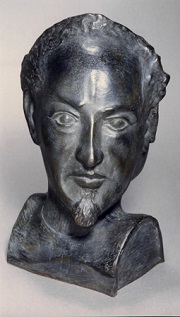
Carl Hauptmann (11 mei 1858 – 4 februari 1921)
Borstbeeld door Thomas Reimann, 2001
Zie voor nog meer schrijvers van de 11e mei ook mijn blog van 11 mei 2015 deel 2.
